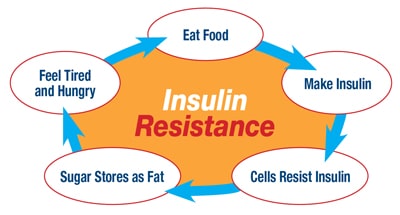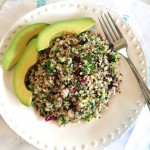
Weight gain is one of the most common side effects associated with polycystic ovary syndrome (PCOS). Recently, Creating a Family Radio interviewed Sunita Kulshrestha, M.D., of Shady Grove Fertility’s Chesterbrook, PA, office, and Hillary Wright, a registered dietitian and Director of Nutrition Counseling for the Domar Center for Mind Body Health at Boston IVF in Boston, MA, to discuss how to identify and treat PCOS as well as dietary and lifestyle changes to improve PCOS symptoms.
How does PCOS affect weight and metabolism?
The main biochemical problem behind PCOS is insulin resistance. Insulin is a hormone that is critical in numerous metabolic roles that have to do with glucose and a body’s metabolism. In women who have PCOS, their body thinks there isn’t enough insulin, so the body tries to produce more. This increase sets off a chain reaction and tells the body to produce a higher level of male hormones. Obesity itself, separate from PCOS, is also associated with insulin resistance. Due to this, it’s easier for a woman with PCOS to gain weight and harder for her to lose it.
Is PCOS the same as metabolic syndrome or prediabetes?
In a sense, they share the same biochemical defect: the early stages of prediabetes show insulin resistance as seen in PCOS. As prediabetes worsens, insulin resistance can lead to glucose intolerance and eventually to diabetes. One of the risks of PCOS, apart from fertility issues, is that you are more likely to end up with diabetes—7.5 percent of women with PCOS have borderline glucose levels and/or diabetes.
How can diet ease symptoms of PCOS?
With PCOS, the goal is to manage insulin resistance rather than just weight loss. Insulin resistance as a condition—with or without PCOS—can make it easier to gain weight and harder to lose it. Managing insulin resistance will increase the likelihood that the weight loss will follow. Studies have shown that a reasonable amount of weight loss can make a woman with PCOS have a better response to fertility treatment.
Is there a type of food that women with PCOS or insulin resistance crave?

If you ask most women with PCOS, they’ll tell you they frequently crave carbohydrates. This is part of the insulin resistance syndrome. Insulin is a hormone that regulates blood sugar levels. If your blood sugar goes down, your brain will know that carbs will bring your blood sugar back up. Carbs aren’t a dirty word, though. It’s about the quality of carbs and the quantity you’re consuming in any one sitting.
Is there a PCOS diet? What type of diet is best for a woman who has PCOS?
The bulk of evidence so far shows that the ideal PCOS diet is more moderate in carbs. You should have a balanced plate: take a plate, ideally a salad plate, and draw a line down the middle. Half of the plate should be non-starchy vegetables, a quarter of the plate should be healthy protein, and then the remaining quarter should be nutrient-rich starch like brown rice or sweet potatoes, legumes or beans or quinoa. With your diet, find that middle ground where you can go and live, not go and visit temporarily. Carbs are the primary fuel for the human body, but we are eating more than we need. Find a healthy balance that’s sustainable.
 Is it better to eat three healthy meals and not snack, or is better to spread eating throughout the day?
Is it better to eat three healthy meals and not snack, or is better to spread eating throughout the day?
If you look at data for people who lose weight and keep it off, they eat an average of 4 to 5 times per day. If you have PCOS, spreading your carbs into smaller meals and snacks throughout the day can help lower your post-meal blood sugar levels. If you think of hunger on a scale of 1-10, research tells us that people are more mindful eaters and eat less if they address their hunger when they’re at a 5 or 6 and no more than that. Frequently we wait until we’re starving and then the central nervous system says you went too long and it’s getting under-fueled. Then you eat whatever is quickest and easiest with more carbs than you need, which shoots up your insulin levels and then knocks them back down again, making it more difficult to lose weight.
Is there any research that would indicate that exercise has a separate benefit for PCOS besides losing weight?
Yes. The vast majority of people who lose weight and keep it off utilize diet and exercise strategies. Exercise is important for weight loss and is critical to maintain weight loss and muscle mass. The more muscle mass people have, the more effectively they’ll be able to clear blood sugar.
Insulin resistance also improves naturally with physical activity. Even without weight loss, people with prediabetes are less likely to get diabetes if they exercise.
Do women with PCOS always have problems trying to conceive?
Not always, however, women with PCOS may have irregular periods or chronic anovulation that can affect fertility. Think of it in these terms: a woman who ovulates monthly has 12 opportunities a year to get pregnant, but a woman who ovulates 5 times per year (for example) has fewer opportunities. Thus, it can make trying to conceive more difficult.
What type of doctor does a woman need to see if she thinks she has PCOS?
It depends on whether or not she’s trying to get pregnant. If a woman has PCOS symptoms, she can start with a primary care physician or endocrinologist to manage the PCOS. But if she’s looking to become pregnant, she should seek help from an OB/GYN or a fertility specialist.
Are there any medications a woman with PCOS may consider if she’s trying to conceive?
For a woman actively trying to get pregnant, there are medications available to help her ovulate and achieve pregnancy. These medications include Clomiphene citrate (Clomid), letrozole (Femara), or hormone injections of follicle-stimulating hormone (FSH). These medications may also be taken in conjunction with intercourse at home or intrauterine insemination (IUI) or in vitro fertilization (IVF). In terms of other medications, there’s also metformin, a diabetes drug that can be used in women to help decrease insulin resistance.
If you would like to learn more about the PCOS diet, or to schedule an appointment, please speak with one of our New Patient Liaisons at 877-971-7755 to schedule an appointment.




